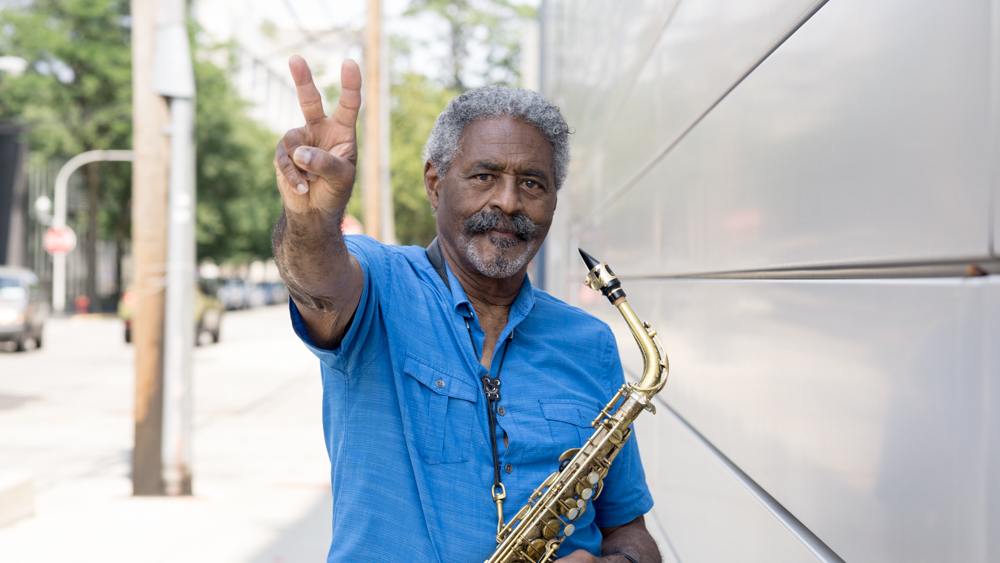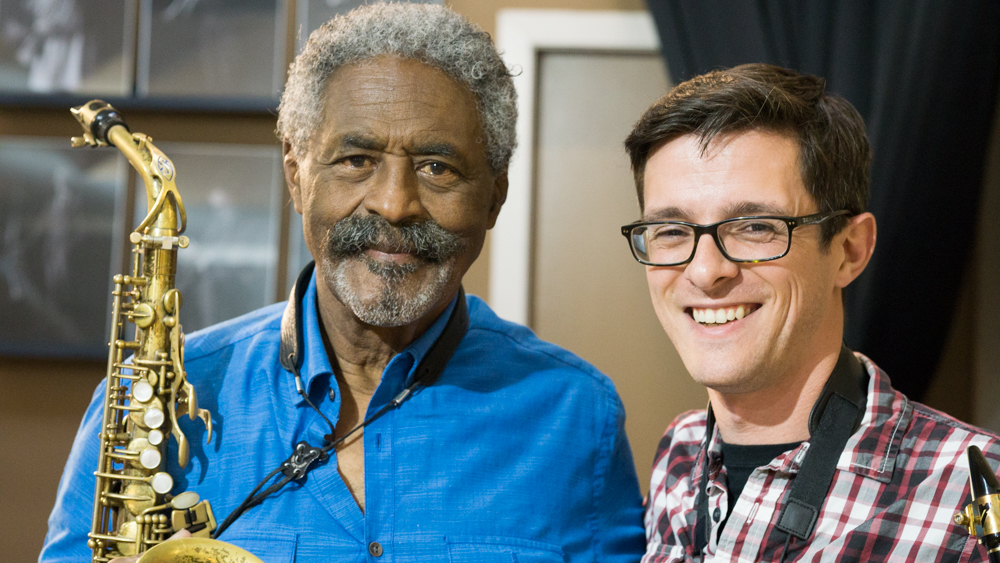An Interview with Charles McPherson Part 1
Date Posted: December 06, 2017

Interview conducted by Michael Fenoglio and Rebecca Scholldorf
When did you decide that you wanted to be a musician and what drew you to that career direction?
I knew I wanted to do that in junior high school so I must’ve been 13 or 14. I started playing in the band, out on trumpet first – trumpet and flugelhorn because the band did not have a saxophone, but I wanted to play saxophone if I could have. In those days, believe it or not, the schools actually had instruments. And at 13-14, I knew I wanted to play. I knew I wanted to do it.
It’s weird what draws people to things. It was really the sound of the saxophone; I really liked it even as a little kid. I liked the sound of it and plus the shape of it, too, for whatever reason. I happened to live in the neighborhood in Detroit where a very good jazz club was right down the street. When I found out that the kind of jazz I liked was featured at this club down the street, that was it. It was like being in heaven or something. I would just go stand outside and listen to the musicians. And the musicians in the house band at this club I’m talking about, here’s who it was:
Elvin Jones on drums
Barry Harris on piano
Pepper Adams on baritone sax
Paul Chambers on bass
That was the house band! And then I started going down and just listening to these guys and that was it. I knew I wanted to do that.
Who have been some of the most influential people that have crossed your path?
Barry Harris was very influential. He’s a piano player and he’s still around. But he was instrumental because he lived in my neighborhood and he’s an excellent piano player and very smart in terms of theory and harmony and just all of that.
But that whole bebop thing, and that’s what was going on when I was 15, that was the jazz genre that was coming in. I got swept up into that, like everybody my age. So of course, people like Charlie Parker, Dizzy Gillespie, Monk and Bud Powell, Stan Getz, and Stan Kinton. There was a whole slew of musicians that were playing this kind of music and in those days we called it modern jazz. Bebop was all a part of that; it’s all part of the same. There were so many players, so many different styles that just infect you.
Any mentors?
Other than Barry Harris. You learn things from records and listening to people. The group of people in Detroit were an interesting group of people and musicians. Besides being really good musicians, they were very well-rounded; they were smart people. And I can remember being over Barry’s house and musicians would always be coming by his house because he had an open-door policy. He played all afternoon and people would come talk about music and play. I can just remember some of the conversations that I would hear with people like Pepper Adams and just other musicians in their house and quite often it wouldn’t be about music. It would be about philosophies. And I’m talking I’m 15 years old and they’d be talking about Nietzsche, Emmanuel Cad. They could just talk about anything. They had an understanding – like literature. They knew all of the great books and they could talk about that other than talking about music. I’m really young and I’m impressed by them. Not just by their playing but basically, it might sound corny, but they were intellectual. They connected what they’re doing with art in general. These guys would know about painting, they would know about Cubism. They would be able to look at a Picasso and say “This is Cubism, this is Impression-istic” They had a broad understanding of a lot of modern art, in music, in poetry, in literature. These people were something. It was impressive for me.
I remember Barry, he would do the New York Times puzzle in about 20 minutes. He just ripped that off. I’m just thinking music but then this is what I’m learning that’s a lot bigger than music. And when these guys play music, they’re not even playing like Aminor7 to D7, that ain’t have nothing to do with it. They’re playing life! And by the way of music. It’s just the medium through which they’re dealing with. But these guys have a world view. This is what I found out – listening to them talk. They had a world view, they weren’t just musicians. They were thinkers. They had a concept of how they think it is and should be. They were bigger than life.
I came to NY in 1960. I started working with Charlie Mingus. That was the first real working band that traveled. He was different than Detroit guys but he did have this: he wrote poetry, he painted, he had a world view, and he was totally into music. These people were bigger than life. They were just characters – they were really something. That generation.
I stayed a long time with Mingus – about 12 years. Drove me completely nuts! I quit for about a year, worked for the Internal Revenue because I had kids. I was like, ‘Man, Mingus, I can’t.’ He was a great musician but…gone…you know? (chuckles). I told myself I have to get away from Mingus. So I went to the Internal Revenue and I worked on 1040s. That was weirder than Mingus (chuckles). I can’t go through with this but I did it for about a year.
It was interesting – I saw a lot of returns. I remember seeing John Coltrane’s return one year. This guy was making $100,000. That was amazing because it was in the sixties. A jazz tenor player and this was during his tour of My Favorite Things with the soprano and Greensleeves. I actually did his return – I saw it! I thought a tenor player playing jazz, making a $100,000 in 1964 or whatever it was pretty impressive.
The last record day I stopped working with Mingus around 1972. But I did do a record date with him in ‘78 – I think that was Mingus’s last record. Mingus had what they called Lou Gehrig’s disease. It’s a horrible disease. It’s a disease that effects the muscles; the nerves in the muscles.
So this is 1978 and it was his last record date. Joni Mitchell had something to do with this record. Her money was involved. She had something to do with it because she was there. Everybody was in this big band: Michael Brecker, Randy Brecker, Me, Lee Konitz, Larry Curry, George Coleman, just everybody. We played and Mingus was sitting in a wheelchair. He could barely move and barely talk. I remember he said, “I would kill myself if I could pick up a pill.” You can’t move – you’re just this *motions to a himself sitting in a chair*. Anyway, so that was the last record date in 1978. The very next day I left New York and moved to California. Mingus, I think he eventually went to Mexico for his alternative treatments. I think he died in Mexico and it was pretty tragic. For me, it was going to California. My mom lived in California in La Joalla which is San Diego. I’m an only child so I started to get concerned about her. She’s getting older and I’m starting to get worried about her. So I went just to come hang out with her and ended up staying. So that’s 1978.
What are some of the challenges you faced then as a musician? When you were at the highest point in your career?
The challenge for me was to try to be because I’m married. I had two kids at that point. Is trying to be a musician and actually play and then make money doing that, be a decent husband, a good father, still play jazz music, and just try to wear all those hats. That’s hard to do. Just the music part – to really do it and be competitive – it’s very self-absorbing. To balance all this self-absorption with actually sharing and being fair, a good husband, good father, and then sitting in a room for 5 hours and practicing. All of that can be real tricky. If you’re making a lot of money, that’s one thing. I don’t have to tell you. So that was a challenge to try to be fair and balance with yourself and with other people that depend on you.
Do you have any advice for people going through that now?
You have to be super-organized if you want to wear all of those hats really well. If you’re going to be married and going to have kids, then you gotta know that that right there in itself, you can’t be this selfish, self-absorbed person. I mean you can do it, but you’re going to be making people not happy. The only thing I can say for young people, you better really organize your life and think farther than you know. You really do have to think ahead of time. You have to be in control of what you want to do, when, and all that kind of stuff.
Now if you’re already in a situation where you’ve got kids, man, that’s the whole challenge is how do you make money? You need money. It’s a capitalistic society. Like it or not, how are you going to balance that with what you want to do? I don’t know. You just have to really know yourself and what you want to do.
If it turns out you want to play, and be in competition with the thousands of players that there are and only a few places to play. There’s a million musicians and only one or two clubs to play in. And then you’re dealing with the supply and demand, you’re dealing with. Most people don’t really care what they’re doing. Most people are into Rock n’ Roll – pop. Not classical music, not jazz. They’re into Snoop Dawg, Lady Gaga, this is what the world wants. So, you’re dealing with an art form where there’s basically no demand. Thousands of players that are good and only a handful of places to play and a world at large that could care less. Now, do you want to do this? And if you do, you better really be in love and you’ve really got to take charge. You’ve got to be organized in terms of how you want to make a living doing this. It’s not easy. You’ve got to come up with a persona, a concept of marketing, what demographic do you want to target, and then how can I still play good music and still be able to do that. There’s the challenge.
It’s very easy to play the dumbest stuff in the world and then market that and just have a persona. So how do you think about that? What are you going to do? The music people – the Herbie Hancocks, the Chick Coreas – there’s some kind of way they tap the market. You couldn’t keep playing Seven Steps to Heaven...it’s not Watermelon Man. Now if you do that, well then yeah. How many people could sit and play Giant Steps. That’s a judgement call that people like us have to do. I don’t know if there’s ten words of less – some formula – I don’t know…encouragement!

Stay tuned for Part 2...
Learn more about Vandoren JUNO reeds - the only reed specifically designed for students.
Subscribe to the We Are Vandoren E-newsletter (WAVE) to receive 4 weekly articles for Performers, Students, and Educators